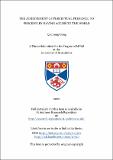The achievement of perceptual presence : to perceive by having access to the world
Abstract
This dissertation provides an enactive approach to perception. It argues that perceptual presence is
achieved by perceivers. They do this by having access to the world through the navigation of
sensorimotor contingencies based on their understanding. In developing this view, the dissertation
defends a version of the enactive account of perception that is originally proposed by Alva Noë and
explores how this account challenges and competes with other accounts of perception, including
sense-datum theory, naïve realism, etc. It also argues that Noë’s enactive account is insightful as he
acutely captures certain features of perceptual phenomena and so makes plausible challenges
towards representationalism about perception. However, he fails to provide a clear and detailed
thesis concerning the way we perceive, especially how sensorimotor understanding can help with
the grasp of the two-dimensionality of presence, i.e., the fact that we perceive how things look and
how they really are at the same time. In order to make the enactive approach a better account, the
dissertation provides an improved explanation of the duality of presence. I argue that things are
always practically remote for us. Such remoteness is the root of the duality as we have to cope with
the remoteness by having access to objects through navigating sensorimotor contingencies. Because
presence is achieved in such a way, it has the two-dimensionality feature. The final chapters provide
an extended explication of the means to the achievement of access by drawing out the way that
sensorimotor understanding is procured through perceivers’ acquiring a sort of practical conceptual
knowledge of their perceptual situations. The dissertation thus ends with the argument that concepts
are necessary skills for perceivers to achieve sustaining access to the world.
Type
Thesis, MPhil Master of Philosophy
Collections
Items in the St Andrews Research Repository are protected by copyright, with all rights reserved, unless otherwise indicated.

